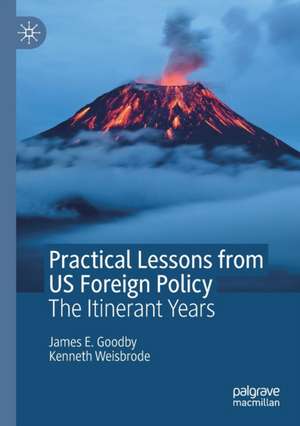Practical Lessons from US Foreign Policy: The Itinerant Years
Autor James E. Goodby, Kenneth Weisbrodeen Limba Engleză Paperback – 14 noi 2020
| Toate formatele și edițiile | Preț | Express |
|---|---|---|
| Paperback (1) | 496.02 lei 6-8 săpt. | |
| Springer International Publishing – 14 noi 2020 | 496.02 lei 6-8 săpt. | |
| Hardback (1) | 500.42 lei 6-8 săpt. | |
| Springer International Publishing – 14 noi 2019 | 500.42 lei 6-8 săpt. |
Preț: 496.02 lei
Preț vechi: 583.55 lei
-15% Nou
Puncte Express: 744
Preț estimativ în valută:
94.93€ • 98.74$ • 78.37£
94.93€ • 98.74$ • 78.37£
Carte tipărită la comandă
Livrare economică 14-28 aprilie
Preluare comenzi: 021 569.72.76
Specificații
ISBN-13: 9783030273149
ISBN-10: 3030273148
Pagini: 231
Ilustrații: XIV, 231 p. 1 illus.
Dimensiuni: 148 x 210 mm
Greutate: 0.33 kg
Ediția:1st ed. 2020
Editura: Springer International Publishing
Colecția Palgrave Macmillan
Locul publicării:Cham, Switzerland
ISBN-10: 3030273148
Pagini: 231
Ilustrații: XIV, 231 p. 1 illus.
Dimensiuni: 148 x 210 mm
Greutate: 0.33 kg
Ediția:1st ed. 2020
Editura: Springer International Publishing
Colecția Palgrave Macmillan
Locul publicării:Cham, Switzerland
Cuprins
Chapter One: Introduction: How Did We Get Here?.- Chapter Two: Global Challenges.- Chapter Three: National Policies.- Chapter Four: Regional Problems.- Chapter Five: Regional Solutions.- Chapter Six: Conclusion: What Have We Learned?
Notă biografică
James E. Goodby is Annenberg Distinguished Visiting Fellow at the Hoover Institution, USA. He is a retired diplomat who was involved in the creation of the International Atomic Energy Agency, and in the negotiation of the limited nuclear test ban treaty, START, the Conference on Disarmament in Europe, and cooperative threat reduction (the Nunn-Lugar program).
Kenneth Weisbrode is Assistant Professor in the Department of History at Bilkent University, Turkey. He is a former defense analyst who has worked at the Atlantic Council of the United States, the European University Institute, the International Institute for Strategic Studies, and the United States Institute of Peace.
Textul de pe ultima copertă
In foreign policy, the Trump administration has appeared to depart from long-standing norms of international behavior that have underwritten American primacy for decades in a more interdependent and prosperous world. In this book, a diplomat and a historian revisit that perception by examining and reproducing several of their own essays during the past twenty years. The essays reveal that Trump's style exaggerates tendencies towards unilateralism already present in the actions, if not the policies, of previous presidents, and in their neglect of three imperatives: collective security, regional integration, and diplomatic imagination. It is not too late, however, to remedy the problem by learning the lessons of the recent past.
James E. Goodby is Annenberg Distinguished Visiting Fellow at the Hoover Institution, USA. He is a retired diplomat who was involved in the creation of the International Atomic Energy Agency, and in the negotiation of the limited nuclear test ban treaty, START, the Conference on Disarmament in Europe, and cooperative threat reduction (the Nunn-Lugar program).
Kenneth Weisbrode is Assistant Professor in the Department of History at Bilkent University, Turkey. He is a former defense analyst who has worked at the Atlantic Council of the United States, the European University Institute, the International Institute for Strategic Studies, and the United States Institute of Peace.
James E. Goodby is Annenberg Distinguished Visiting Fellow at the Hoover Institution, USA. He is a retired diplomat who was involved in the creation of the International Atomic Energy Agency, and in the negotiation of the limited nuclear test ban treaty, START, the Conference on Disarmament in Europe, and cooperative threat reduction (the Nunn-Lugar program).
Kenneth Weisbrode is Assistant Professor in the Department of History at Bilkent University, Turkey. He is a former defense analyst who has worked at the Atlantic Council of the United States, the European University Institute, the International Institute for Strategic Studies, and the United States Institute of Peace.
Caracteristici
Acts as a compelling and thought-provoking challenge to the conventional wisdom of the Clinton, Bush, and Obama administrations Covers the transition from what is usually thought of as the “post-Cold War era” to an era characterized by a struggle to define a new international system Provides both a contemporary history of this period in the United States and a collection of lessons learned from the mistakes and successes during an era of rapid change
